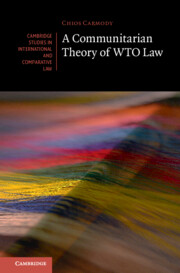Book contents
- A Communitarian Theory of WTO Law
- Cambridge Studies in International and Comparative Law: 181
- A Communitarian Theory of WTO Law
- Copyright page
- Dedication
- Epigraph
- Contents
- Figures
- Preface
- Acknowledgments
- 1 A Theory of WTO Law
- 2 The WTO Agreement as Community
- 3 The WTO Agreement and Justice
- 4 The WTO Agreement as a Law of Obligations
- 5 The WTO Agreement as a Law of Rights
- 6 The WTO Agreement as a Sui Generis Legal System
- 7 A Communitarian Theory and International Investment Law
- 8 Some Concluding Thoughts
- Bibliography
- Index
- Cambridge Studies in International and Comparative Law
3 - The WTO Agreement and Justice
Published online by Cambridge University Press: 14 December 2023
- A Communitarian Theory of WTO Law
- Cambridge Studies in International and Comparative Law: 181
- A Communitarian Theory of WTO Law
- Copyright page
- Dedication
- Epigraph
- Contents
- Figures
- Preface
- Acknowledgments
- 1 A Theory of WTO Law
- 2 The WTO Agreement as Community
- 3 The WTO Agreement and Justice
- 4 The WTO Agreement as a Law of Obligations
- 5 The WTO Agreement as a Law of Rights
- 6 The WTO Agreement as a Sui Generis Legal System
- 7 A Communitarian Theory and International Investment Law
- 8 Some Concluding Thoughts
- Bibliography
- Index
- Cambridge Studies in International and Comparative Law
Summary
Interdependence-generating goods will not arise unless actors view arrangements as right or correct. This perception gives rise to a preoccupation in communities with what is just. It necessitates the development of a theory of justice that coordinates with the theory of community developed above. Justice in relation to goods can be thought about in two forms: either as a matter of the good’s distribution ex ante or its correction ex post. Nevertheless, this two-fold structure is simplistic in that it fails to account for the fact that justice must promote an ideal of just relationships. The theory of justice developed in this chapter therefore posits that the interaction of distributive and corrective justice over time gives rise to transformative justice. The transformation in question relates both to the nature of the good and the attendant conception of a wrong. The chapter details how transformative justice is an outcome visible in both international and WTO law. At the same time, the chapter suggests that WTO law’s transformative justice is not perfectly just, a deficiency that gives rise to a continuing impetus at reform.
Keywords
- Type
- Chapter
- Information
- A Communitarian Theory of WTO Law , pp. 108 - 197Publisher: Cambridge University PressPrint publication year: 2023



